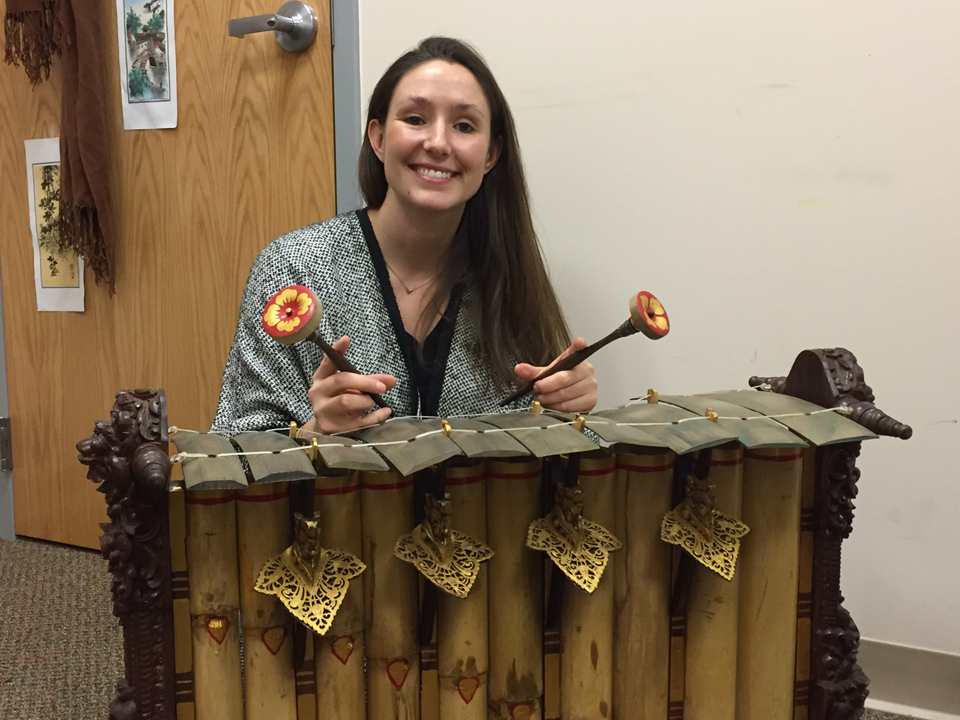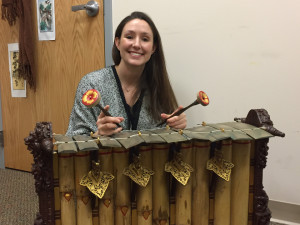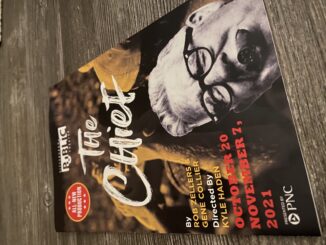

By Sydney McCabe | The Duquesne Duke
Visiting Assistant Professor of Ethnomusicology Meghan Hynson wrote her dissertation on Balinese Shadow Puppet Theater. After spending four years in Bali and constructing a system for transcribing traditional Balinese music, which is taught orally and which only four people, including Hynson, have a mastery of today, Hynson is teaching world music courses at the Mary Pappert School of Music.
Q: What inspired your research in Balinese Shadow Puppet Theater?
A: I had just started traveling a little bit in college and I just became fascinated with music as a way to explore other cultures and to guide my traveling — to use music as a way to explore the culture, the music, the things that were going on. I went to Bali, and I heard this music and loved it. I loved the Shadow Puppet Plays. The plays dramatize the folktales and the religious epics of Hindu legend, and the music accompanying it was just a totally different scale. Here we have seven tones whereas there it’s pentatonic, they have five tones. I thought it was really different and fascinating and a good way for me to understand the Balinese culture and religion. I just loved the island and the people. And ended up living there for four years.
Q: Can you speak about the experience of living for four years in Indonesia?
A: It was exhilarating but it was also challenging at times. People often look at me and say, “Oh wow, that’s so cool that you did that!” But first of all, you have to realize that I’m a young woman and perceptions toward women are very different there. Also, learning the language was a huge thing. I spent lots and lots of time doing language study. It’s probably as far away from here as you could possibly go — you’re talking about three different flights. There was a full year when I left [the United States] and did not come back, did not see my family or anybody I knew for a year so homesickness becomes a big thing. So does cultural differences. I didn’t know I couldn’t hang my clothes up outside, and I got reprimanded one day. It was fun, but it was also draining trying to learn to live in a new culture. But at the same time, the pace of life was so nice. I was in a really rural area, I didn’t have any hot water, the food was different, the people didn’t understand how I could be unmarried or traveling alone. My teacher, who became a second father to me, would take me to the temple ceremonies, and I would accompany the traditional Shadow Puppet Plays, and I gained an insider’s perspective.
Q: In your opinion, what is it about music that makes it so integral to our everyday lives and our cultures?
A: Music is very culturally specific, and the meanings that we attach to music are also very culturally specific. People [in other cultures] see music as helping them to communicate with gods or reach a meditative state. I think music is the means by which, for me, I can gain insights into all these different ideologies, and it has really helped me to understand how people think in different areas in the world. I think when you can cultivate an understanding that all of these [ideologies] are different and that one is not necessarily better than the other, you start to cultivate an understanding and appreciation for them. And then that shatters stereotypes you have about people and creates a new understanding of a lot of the issues we face in society.
Q: Last question, if you’re listening to music, what is most likely playing?
A: I really like classical guitar or new age soothing meditative music, usually for yoga or work. But at the same time, I’m just like everybody else, I really like techno. It depends on what sort of mood I am in. There is this great group from Africa, and their music has this great beat because it mimics the sounds of their camels traveling. But I also like Bon Iver, The xx, Calvin Harris, Ani DiFranco and her feminine energy. I listen to all kinds of stuff.




